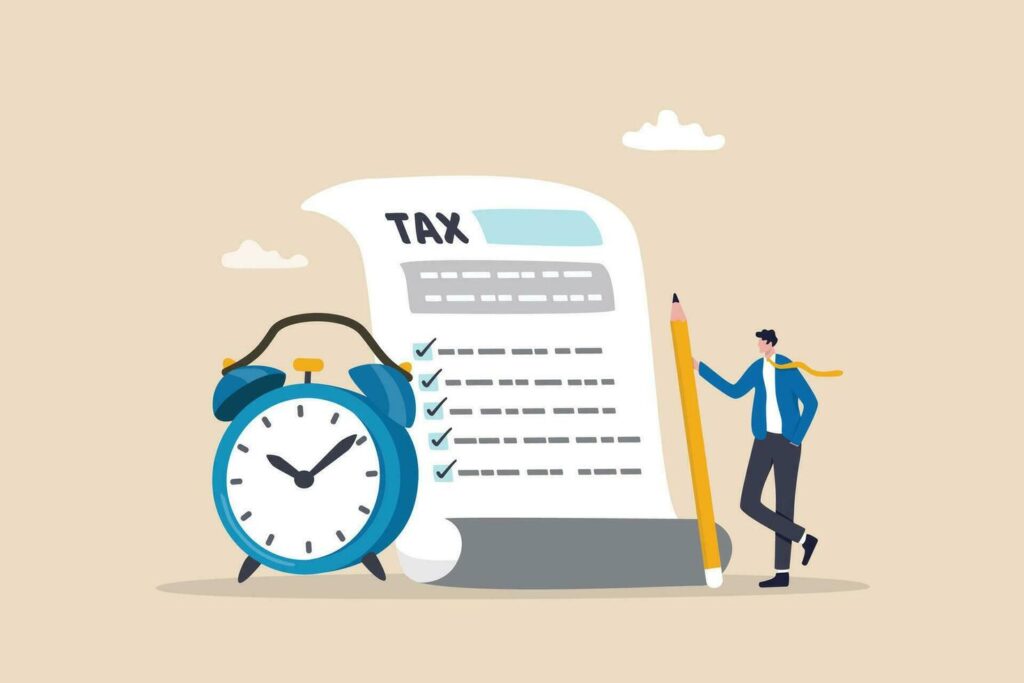Tax planning is an essential financial strategy that goes beyond the traditional perception of being a seasonal task. While many individuals associate tax planning solely with the annual April tax deadline, the truth is that effective tax planning offers year-round advantages that go far beyond a mere focus on a single month.
Understanding the Basics of Tax Planning
Tax planning is the process of strategically managing your financial affairs to minimize your tax liability legally. It involves analyzing your income, expenses, and investments to optimize your tax benefits while complying with the tax laws and regulations.
When it comes to tax planning strategies, it’s important to have a clear understanding of how the tax system works. This includes knowing the different tax brackets, deductions, credits, and exemptions that may be available to you. By having this knowledge, you can make informed decisions about your finances and take advantage of any tax-saving opportunities that may arise.
Defining Tax Planning and Its Importance
Tax planning plays a crucial role in maximizing your financial resources and ensuring that you retain more of your hard-earned money. It involves thoughtful and thorough assessments of your financial situation to identify potential tax-saving opportunities and implement strategies accordingly.
One of the key benefits of tax planning is that it allows you to reduce your overall tax liability. By strategically managing your income and expenses, you can minimize the amount of taxable income you have, which in turn lowers the amount of tax you owe. This can result in significant savings over time.

Another important aspect of tax planning is ensuring compliance with tax laws and regulations. By staying up to date with the latest tax rules, you can avoid penalties and other legal issues that may arise from non-compliance. This is particularly important for businesses, as failure to comply with tax laws can have serious consequences.
The Role of a Tax Planner
A tax planner is a professional who is well-versed in tax laws and regulations. They are equipped with the knowledge and expertise to help individuals and businesses navigate the complexities of tax planning. Their primary role is to provide personalized advice and create tailored tax strategies that align with their client’s financial goals.
When working with a tax planner, they will typically start by conducting a thorough analysis of your financial situation. This includes reviewing your income, expenses, investments, and any other relevant financial information. Based on this analysis, they will identify potential tax-saving opportunities and develop a comprehensive tax plan.
In addition to creating a tax plan, a tax planner can also assist with tax preparation and filing. They can ensure that all necessary forms and documents are completed accurately and submitted on time. This can help to minimize the risk of errors or omissions that could result in penalties or audits.
Furthermore, a tax planner can provide ongoing support and guidance throughout the year. They can help you stay updated on any changes to tax laws that may affect your financial situation and make adjustments to your tax plan as needed. This proactive approach can help to maximize your tax savings and minimize any potential tax liabilities.
In conclusion, tax planning is an essential aspect of managing your finances effectively. By working with a tax planner and implementing strategic tax strategies, you can optimize your tax benefits, ensure compliance with tax laws, and ultimately retain more of your hard-earned money.
The Misconception of Tax Planning as a Seasonal Task
One common misconception about tax planning is that it is only necessary during the tax season leading up to April. However, this limited perspective fails to acknowledge the significant risks and missed opportunities that come with last-minute tax planning.
When it comes to tax planning, taking a proactive approach throughout the year can yield substantial benefits. By staying informed about changes in tax laws and regulations, individuals can make strategic financial decisions that minimize their tax liability. This approach allows for careful consideration of various tax-saving strategies, such as maximizing deductions and credits, managing investments, and optimizing retirement contributions.
Debunking the ‘April-Only’ Tax Planning Myth
Waiting until April to start thinking about tax planning can result in rushed decisions, overlooked deductions, and increased chances of making costly mistakes. By embracing year-round tax planning, individuals can take a proactive approach and effectively minimize their tax liability.
One of the key advantages of year-round tax planning is the ability to analyze and adjust financial strategies based on changing circumstances. By regularly reviewing income, expenses, and investments, individuals can identify opportunities to optimize their tax situation. This includes considering factors such as changes in employment status, marital status, or the birth of a child, which can have significant implications for tax planning.
The Risks of Last-Minute Tax Planning
Last-minute tax planning often leads to hasty decision-making, limited options, and missed opportunities for potential deductions and tax credits. It can also increase the chances of triggering an audit or facing penalties due to errors or inadequate documentation.
When individuals rush through the tax planning process, they may overlook valuable deductions or fail to take advantage of tax credits that could significantly reduce their tax burden. Additionally, last-minute tax planning leaves little time for careful consideration and research, increasing the likelihood of making errors or missing out on potential tax-saving opportunities.
Furthermore, inadequate documentation is a common pitfall of last-minute tax planning. Failing to keep accurate records and receipts throughout the year can lead to difficulties in substantiating deductions or credits, potentially resulting in penalties or an audit by the tax authorities.

By contrast, engaging in year-round tax planning allows individuals to maintain organized financial records, ensuring that they have the necessary documentation to support their tax claims. This not only reduces the risk of penalties but also provides peace of mind knowing that their tax return is accurate and well-prepared.
In conclusion, tax planning should not be limited to the months leading up to April. By adopting a year-round approach, individuals can optimize their tax situation, minimize their tax liability, and avoid the risks associated with last-minute tax planning. Taking the time to stay informed, plan strategically, and maintain proper documentation can lead to significant financial benefits in the long run.
The Advantages of Year-Round Tax Planning
Adopting a year-round tax planning mindset brings numerous benefits beyond minimizing tax liability. Let’s explore some of the key advantages:
Financial Benefits of Continuous Tax Planning
By engaging in year-round tax planning, individuals can optimize their financial situation and make strategic decisions that yield long-term benefits. This includes reducing taxable income, maximizing deductions and credits, and exploring investment opportunities that offer tax advantages.
One of the financial benefits of continuous tax planning is the ability to reduce taxable income. By carefully analyzing expenses and income throughout the year, individuals can identify opportunities to lower their taxable income. This can be done through various strategies such as maximizing contributions to retirement accounts, taking advantage of tax deductions, and strategically timing income and expenses.
Another advantage of year-round tax planning is the ability to maximize deductions and credits. By keeping track of eligible expenses and ensuring proper documentation, individuals can take full advantage of deductions and credits that can significantly reduce their tax liability. This includes deductions for expenses such as mortgage interest, medical expenses, and education-related expenses, as well as credits for things like child care and energy-efficient home improvements.
Furthermore, year-round tax planning allows individuals to explore investment opportunities that offer tax advantages. By staying informed about tax laws and regulations, individuals can make informed decisions about investments that can minimize their tax liability. This may include investing in tax-advantaged retirement accounts, such as IRAs or 401(k)s, or taking advantage of tax benefits associated with certain types of investments, such as real estate or renewable energy.
Stress Reduction and Peace of Mind
Knowing that your tax affairs are well-managed throughout the year can provide a sense of security and alleviate the stress associated with the looming tax season. Year-round tax planning allows individuals to stay organized and makes the tax filing process smoother and less daunting.
One of the key advantages of year-round tax planning is the reduction of stress. By consistently monitoring and managing tax-related matters throughout the year, individuals can avoid the last-minute rush and panic that often accompanies tax season. This can lead to a more relaxed and stress-free experience when it comes time to file taxes.
In addition, year-round tax planning allows individuals to stay organized. By keeping track of financial documents, receipts, and other important paperwork throughout the year, individuals can easily access the information they need when it’s time to file taxes. This can save time and effort, as well as reduce the risk of missing important deductions or credits.
Furthermore, year-round tax planning provides individuals with peace of mind. By proactively managing their tax affairs, individuals can ensure that they are in compliance with tax laws and regulations. This can help prevent costly mistakes or audits, providing individuals with the reassurance that they are fulfilling their tax obligations correctly.

Key Elements of Effective Year-Round Tax Planning
Effective year-round tax planning involves incorporating certain essential elements into your financial strategy. Let’s take a closer look:
Regular Financial Review and Adjustments
To ensure that your tax planning remains proactive and effective, regular financial reviews are crucial. This involves assessing your income, expenses, investments, and life events to identify changes that may impact your tax situation. By staying up-to-date, you can make necessary adjustments and optimize your tax strategies accordingly.
Strategic Tax Deductions and Credits
Identifying and maximizing tax deductions and credits is a key aspect of year-round tax planning. By staying informed about available deductions and credits, individuals can leverage these opportunities to minimize their tax liability. This may include deductions for education, homeownership, medical expenses, and retirement contributions, among others.
Choosing the Right Tax Planner for Year-Round Service
When it comes to year-round tax planning, seeking expert advice from a qualified tax planner can make a significant difference. Here are some factors to consider when selecting a tax planner:
Qualities to Look for in a Tax Planner
Look for a tax planner who possesses the necessary qualifications, certifications, and experience in tax planning. They should demonstrate a deep understanding of tax laws and regulations and have a track record of successfully assisting clients in optimizing their tax strategies.
The Role of a Tax Planner in Financial Management
In addition to providing tax planning advice, a tax planner can play a vital role in overall financial management. They can offer insights on investment strategies, retirement planning, and other areas that intersect with tax implications. By considering the bigger financial picture, a tax planner can provide comprehensive guidance and help individuals achieve their financial goals.
By embracing the benefits of year-round tax planning and enlisting the expertise of a qualified tax planner, individuals can optimize their financial situation, reduce stress, and maximize their long-term financial success. Don’t limit tax planning to the month of April; make it a year-round priority to reap the rewards of expert tax planning.
More to read: Smart Strategies for Tax Success


